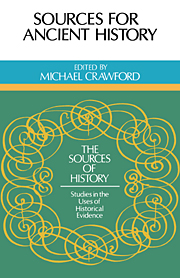1 - Literature
Published online by Cambridge University Press: 06 January 2010
Summary
All written texts provide evidence of the ideas, opinions, interests and levels of education of their authors, of the extent of their freedom and of the nature of their conditioning. Furthermore, insofar as a text is a work of literature, it bears the mark of a particular personality and of his unique interpretative vision; it reflects also the culture, the taste and the ideological, political and literary currents of the time; it may be representative of the historical context in which it is created and of political, social and economic factors. In approaching literary (and other) texts it is, of course, crucial to attempt to understand the intentions behind their creation and the means used to achieve these intentions; but the later history and transmission of a work are also anchored in the most diverse geographical and cultural contexts, which may enrich or alter its significance. A further problem arises from the likelihood of mistakes in the course of the copying of literary texts in antiquity and the Middle Ages. The preservation of a text which is at all close to its original is very rare; the recently discovered papyrus from Qasr Ibrim, which contains two virtually complete elegies of Gallus, is a case in point (JRS 69 (1979), 125–5). In feet, the very survival of ancient literature is often the result of mere chance or of interests quite unrelated to the intentions of the authors concerned.
The historian approaches ancient literary texts with historiographical interests, using methodological approaches of great diversity; these interests and approaches derive basically from problems and pressures belonging to the society of the historian, to his political leanings, to his moral sense.
- Type
- Chapter
- Information
- Sources for Ancient History , pp. 1 - 79Publisher: Cambridge University PressPrint publication year: 1983
- 1
- Cited by

